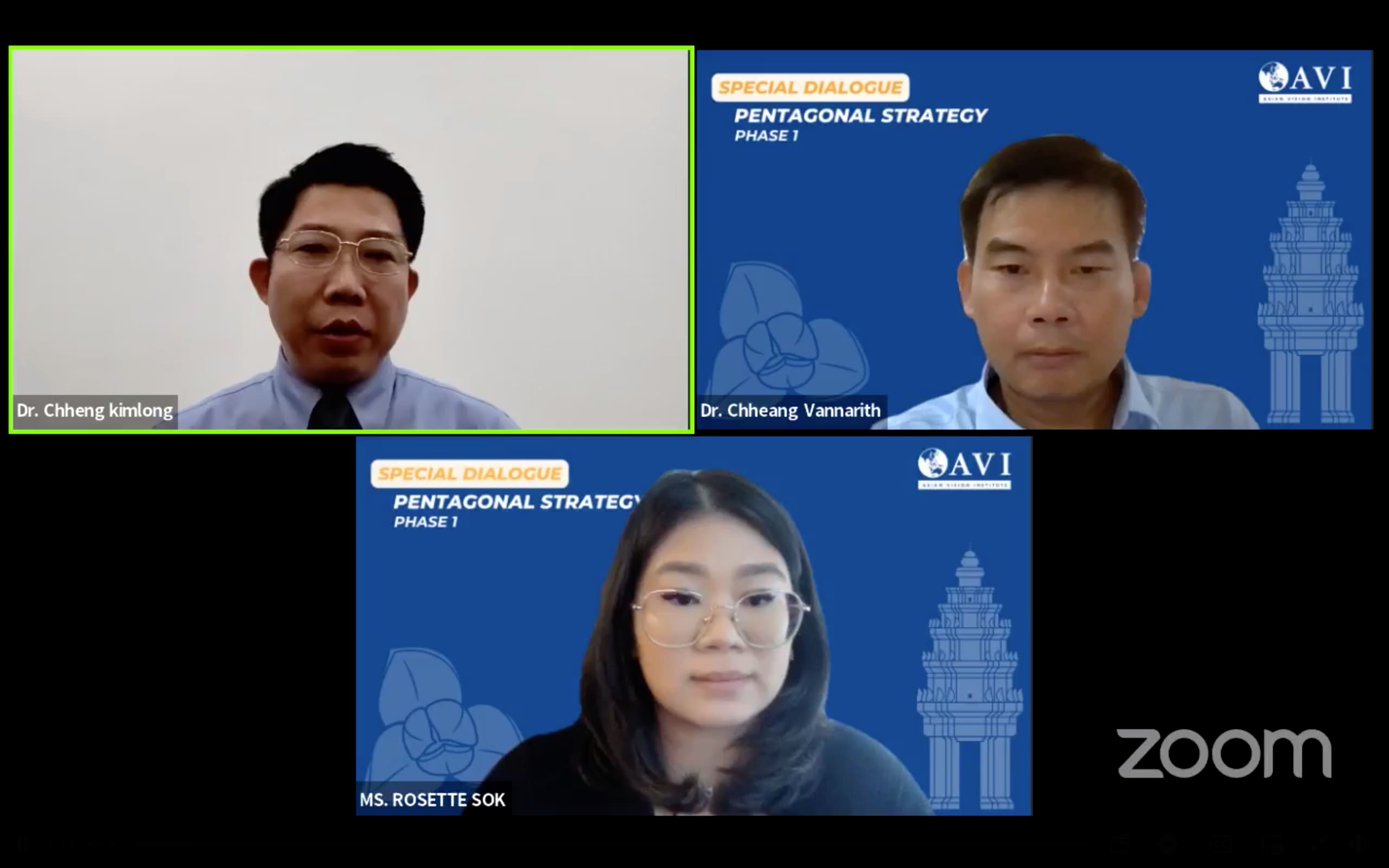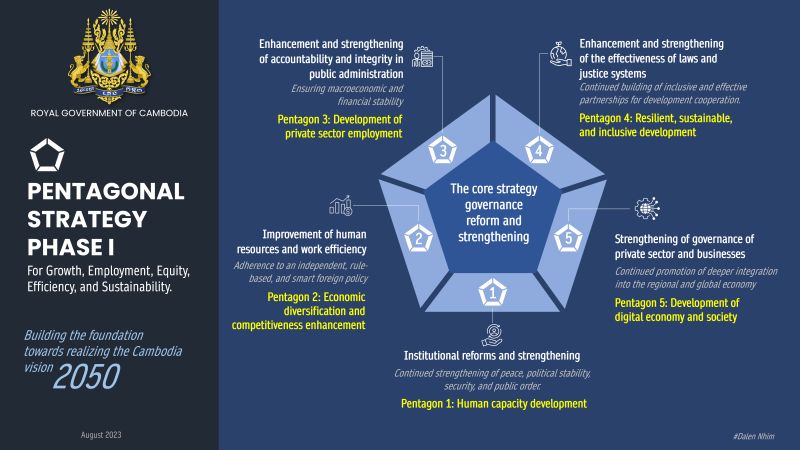What Is Cambodia’s New Pentagonal Strategy?

On August 24, 2023, the Royal Government of Cambodia unveiled the ‘Pentagonal Strategy - Phase 1’, aimed at fostering economic growth, job creation, equity, efficiency, and sustainability over the next 25 years.
Dr. Chheang Vannarith and Dr. Chheng Kimlong discuss the Pentagonal Strategy - Phase 1 during an online seminar. The Asian Vision Institute (AVI) organised an online seminar on September 4, 2023, to delve into the Pentagonal Strategy’s goals, visions and key priorities, as well as its implications for Cambodia's socio-economic development during the 7th Legislature of the National Assembly. The two keynote speakers who shared their special insights during the seminar were Dr. Chheang Vannarith, President of AVI, and Dr. Chheng Kimlong, Executive Vice-President of AVI.
What Is The Pentagonal Strategy?
The Pentagonal Strategy - Phase 1 is the successor to the Royal Government of Cambodia’s previous Rectangular Strategy, encompassing a comprehensive set of strategic visions, missions, and objectives to achieve the country’s national development plan. It is the main strategic framework that will guide development in Cambodia over the next five-year government mandate. The main policy agenda for Cambodia’s development has transformed from a Triangular Strategy (1998-2003), to a Rectangular Strategy (2004-2023), and now finally a Pentagonal Strategy, adapting along with the shifting national and global contexts. Constructed upon the foundation of the previous development agenda, Dr. Chheng Kimlong explained that the Pentagonal Strategy has the primary aim of realising ‘Cambodia Vision 2050’, in which Cambodia strives to become an upper-middle income country by 2030, and a high-income country by 2050.
Transformation Of Cambodia’s Development Strategy
Elaborating more on the history and transformation of Cambodia’s development strategies, Kimlong explained that the first strategy implemented by the government, the Triangular Strategy, prioritised maintaining peace, stability, and security, combating poverty, and integrating Cambodia into the regional and global economy. The latter of these points involved a process of economic liberalisation, the promotion of income growth, and the expansion of Cambodia's regional and global economic engagement. In 2004, the government introduced the first phase of the Rectangular Strategy including four main objectives: growth, employment, equity, and efficiency. The same year, Cambodia also became a member of the World Trade Organization (WTO). Today’s Pentagonal Strategy introduces a crucial expansion into the concept of sustainability. Cambodia strives to achieve resilient, robust, and sustainable economic growth and development by maintaining its care of land, natural resources and biodiversity, which are fundamental to the country's economic production.
Key Priorities Of The Pentagonal Strategy
 Five key pillars of the Pentagonal Strategy - Phase 1. Source: Dalen Nhim. Dr. Chheang Vannarith stated that the Pentagonal Strategy includes a new priority towards technology development, adding to the Rectangular Strategy’s previous priorities on people, roads, water, and electricity. He stated that the government's increased focus on technology results from the COVID-19 pandemic, as this global health emergency highlighted the necessity of digital transformation for socio-economic resilience.
Five key pillars of the Pentagonal Strategy - Phase 1. Source: Dalen Nhim. Dr. Chheang Vannarith stated that the Pentagonal Strategy includes a new priority towards technology development, adding to the Rectangular Strategy’s previous priorities on people, roads, water, and electricity. He stated that the government's increased focus on technology results from the COVID-19 pandemic, as this global health emergency highlighted the necessity of digital transformation for socio-economic resilience.
“Technology plays an increasingly important role in socio-economic transformation, and also helps Cambodia stay ahead of the curve, stay competitive in the context of regional migration and globalisation,” said Vannarith.
He added, however, that there needs to be a greater focus on capacity building for technological adoption, adaptation, and transformation. “It's not easy, you need to invest a lot in human resources, training and skills development and, of course, [there is the] need to build infrastructure, digital infrastructure, technological infrastructure, so that we can advance together,” he said. He positively noted the strategy’s inclusion of ‘resilience’ in every sector – such as ‘public sector resilience’ and ‘climate change resilience’ – which is a concept that did not appear in the previous five-year plan. However, he pointed out the lack of proper elaboration on each term, and emphasised the need for more policy dialogue and academic research on key areas of resilience. Vannarith also added that the government’s main priority for the last four months of 2023 is in education and healthcare. “The basic philosophy of nation building is to feed your people and educate your people,” he said. “Healthcare and education are the two most important foundations for socio-economic development.”
Implementing The Pentagonal Strategy

PM Hun Manet chairing the first plenary meeting of the Council of Ministers of the 7th Legislature of the National Assembly. Kimlong stated that the development of short term action plans is imperative for implementation, followed by an envisioning of what the next phase of the Pentagonal Strategy might look like, as well as a prioritisation of multi-stakeholder collaboration. He noted that a clear definition of stakeholders implementing the new policy will be needed to improve efficiency, coordination and cooperation, along with greater efforts to reduce the red tape of bureaucracy and the avoidance of a bottleneck that could cause the strategic plan and roadmaps to falter. Kimlong further stressed the importance of distributing appropriate national budgets to ministries and the grassroots level, with a focus on cost-reduction, time-saving and procurement efficiency for smoother implementation. Achieving this, however, will also require the larger committed efforts of multiple stakeholders outside the government. Private sector entities, for example, could contribute by promoting skills development through Technical and Vocational Education and Training (TVET) programs.
Implementation Challenges
Vannarith described a number of challenges that come with the new Pentagonal Strategy, potentially making its implementation an uphill battle for the public sector. Government ministries have to first develop their own roadmaps for implementation, evaluating and selecting components from the strategy to include in their respective portfolios. However, in doing so, ministries have to also maintain synergy, equal share of resources and collective capacities with one another in order for widespread implementation to be truly successful. Vannarith also pointed out the Pentagon Strategy's approach on the ‘Dynamics of Stakeholder System’, which means the government will need to identify how, and with whom, to collaborate within both public and private sectors. The private sector, he said, will need to carefully review this new policy and select the elements that fit into their business investment portfolios, with consideration of how they can utilise these elements to gain a competitive advantage in the market. He also emphasised that cultural and behavioural issues, especially the need to address corruption, remain important. He highlighted the significance of conducting behavioural insight analyses to understand the dynamics of the stakeholder system and learn how behavioural change can be achieved within organisations and institutions. Scenario planning will also be crucial for government agencies, including the need to analyse and predict multiple architectures and have strategic foresight to effectively address challenges.
“We need to learn how to imagine together, [to have a] collective imagination [that] leads to the realisation of our vision,” said Vannarith. “We need to have a collective vision… to mobilise our columns of knowledge… so we can realise this Pentagon Strategy.”
Expected Results In Five Years

Cropped image from Kiensvay. Vannarith stated that the implementation of the Pentagonal Strategy’s first phase will likely be impacted by shifting global, regional and national circumstances. These include the ongoing war in Ukraine, growing geopolitical rivalry between the United States and China, and economic slowdown in both China and Vietnam. On the national level, the Cambodian real estate sector is still struggling, which has significant implications for the financial and banking sector. Governance remains the core focus of reforms under the new strategy. Vannarith shared that he believes the new leadership introduces more clinical expertise into public institutions, with the new generation of politicians bringing in more technical knowledge. He encouraged the involvement of more leaders with technical expertise at the sub-national level. "We need to have more technocrats, more bureaucrats, and especially more technical experts, in order to drive these reforms forward," he concluded.
Read More on Cambodian Government Policy: